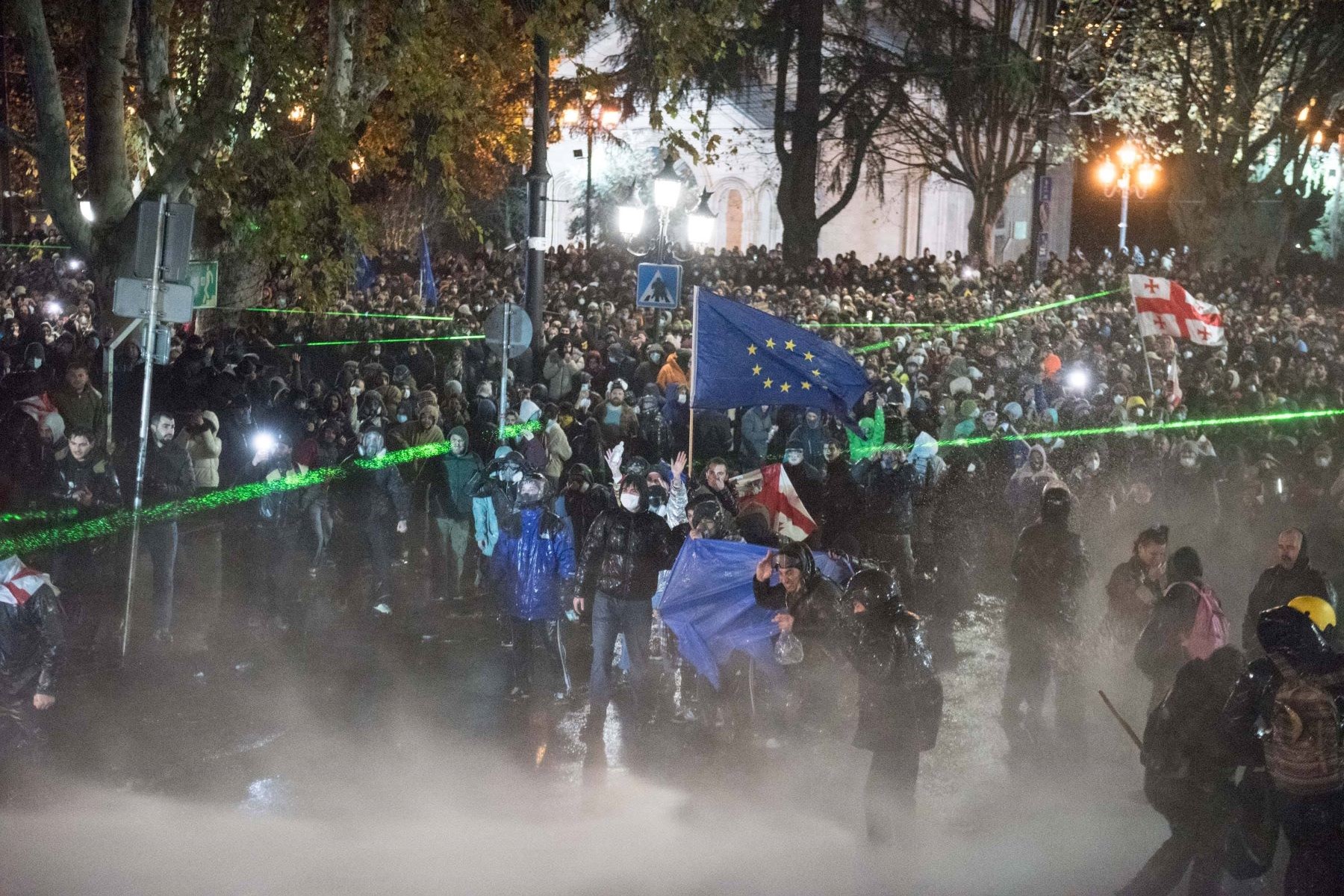War of words between Georgian Dream and EU Ambassador to Georgia

After a tense night of confrontation between protesters and riot police in the central streets of Tbilisi, Georgian Dream’s communications department, Prime Minister Irakli Kobakhidze, and other lawmakers from the parliamentary majority have claimed that Georgia hasn’t halted the country’s EU membership bid until the end of 2028.
On Friday, a Georgian Facebook account named Sinamdvileshi (‘in fact’), which local media have said is Georgian Dream’s communications department, blamed EU Ambassador to Georgia, Paweł Herczyński, for ‘spreading disinformation’ regarding Prime Minister Irakli Kobakhidze’s statement on Thursday that Georgia was halting its EU membership bid until 2028.
According to the Facebook post ‘in fact, the government has emphasised that it will meticulously follow the implementation of the Association Agreement and will have 90% of the Association Agreement implemented by 2028’.
Earlier that on Friday, Herczyński told media that the EU was processing the implications of Kobakhidze’s announcement.
‘I think that all of us have woken up today in a completely new reality. We took note of the announcement of Mr. Kobakhidze yesterday, announcing that Georgia is not interested in pursuing EU integration in the next four years. Of course, this is extremely regrettable’, he said.
Herczyński called the decision regrettable and heartbreaking, saying that it contradicts both the clearly expressed wishes of the majority of the Georgian people and the existing policy of all Georgian governments.
Answering a reporter’s question on the potential EU response, Herczyński said that ‘all the options are on the table’ and claimed these options include the possibility of suspending the visa-free travel with Georgia
Herczyński said Georgia will be discussed by 27 EU member states at the upcoming meeting of the Foreign Affairs Council on 16 December.
Georgian Dream hits back
In addition to Georgian Dream’s communications department, Kobakhidze also on Friday attacked Herczyński for allegedly spreading disinformation and threatened a ‘diplomatic response’.
‘Mr. Paweł Herczyński, who claimed that the process of Georgia’s integration into the European Union was suspended, now claims that this process was stopped by the Georgian authorities’, he said, meaning EU’s statement made in June, saying that Georgia’s accession ‘de facto’ on halt.
‘For some time, we have been avoiding diplomatic responses to such events, but everything has its limits and if we do not see a change in behavior, in the future we will definitely have to respond to such facts, both to the EU Ambassador and other relevant ambassadors. We are talking about a diplomatic response’, Kobakhidze said. He did not specify what he meant by such a response.
While announcing a pause in the membership process on Thursday, Kobakhidze also claimed that the government would continue ‘fulfilling the obligations outlined in the Association Agenda and the [Deep and Comprehensive] Free Trade [Area] agreement’, pledging to meet ‘over 90%’ of them by 2028.

Kobakhidzhe said the opening of accession negotiations with the EU would not be ‘on the agenda’ during the current parliament’ and that the government would also be refusing any budgetary support from the EU.
Without offering any details or further explanation, Kobakhidze alleged that Georgia would be ‘economically prepared’ to begin negotiations with the EU only by the end of 2028, aiming for membership by 2030.
‘We intend to join the European Union not through begging or standing on one leg, but with dignity, by establishing a well-functioning democratic system and a strong economy’, he said.
[Read more: Georgian Dream to halt EU membership bid]
In Friday’s briefing, Kobakhidze claimed that the opening of negotiations is a formal decision that does not accelerate the country’s accession to the EU.
Kobakhidze cited the examples of Serbia, Montenegro, and Turkey, whose accession process, according to him, was not affected by the opening of negotiations.
‘Against this background, it is all the more unacceptable that the issue of opening completely useless negotiations is being used as an instrument of blackmailing our country and dividing society’, he said, adding that the Georgian government has not stopped the European integration process.
Kobakhidze declined to add that in fact, Montenegro’s accession path to the EU has made considerable progress since negotiations were opened in 2012, and due to the implementation of recommended reforms, is on track to join the bloc before the end of the decade.
Croatia, the most recent country to join the EU, first applied in 2003 and was accepted in 2013. The lack of progress in Turkey and Serbia, the other two countries Kobakhidze cited, is widely viewed as stemming from the failure to implement reforms and the comparatively lower support among the populace for joining.
[Read more: Georgian police crack down on pro-EU demonstration in Tbilisi]
Nonetheless, Georgian Dream officials have continued to spin Kobakhidze’s announcement and the subsequent protests, asserting that demonstrators are being misled.
Georgian Dream’s General Secretary and the Mayor of Tbilisi, Kakha Kaladze said on Friday that the protest was ‘based on a lie’.
‘We saw a false protest based on lies […] as if Georgia had stopped the process of joining the European Union. The leitmotif was […] statements, as if the government had made this decision. It was a lie!’ he said.
Kaladze claimed that Georgian Dream is ‘doing everything we can to ensure the country’s European integration, but it must be done with dignity, we will not give anyone the opportunity to have the attitude towards Georgia that we have seen in recent months’.
‘We hear insulting statements, adopted resolutions that are saturated with lies, slander, and blackmail’, he said
‘Here I am, the General Secretary of the party, I am the mayor of the capital, do you want to open negotiations? Open, we are ready, who is stopping you?!’ he claimed. ‘We will not allow anyone to blackmail the people’.
Parliamentary majority member, Guram Macharashvili also called on the EU ambassador to open negotiations.
‘We want to “open negotiations” for EU membership, you want to trade and incite radicalism. If this is not the case, open negotiations and you will see our readiness and advantage on the path to European integration’, he said.
Kobakhidze’s announcement on Thursday sparked protests in several cities across the country, including Tbilisi, where thousands of demonstrators stayed overnight on Rustaveli Avenue.

Period clashes with riot police wielding pepper spray, water cannons, and tear gas continued through the night. Demonstrators, opposition figures, and journalists were targeted with beatings and other forms of violence.
At least 20 journalists and camera personnel, as well as several politicians and law enforcement officers, were reportedly injured during the crackdown by law enforcement officers.
The Interior Ministry has stated they detained 43 people during the overnight protest.









